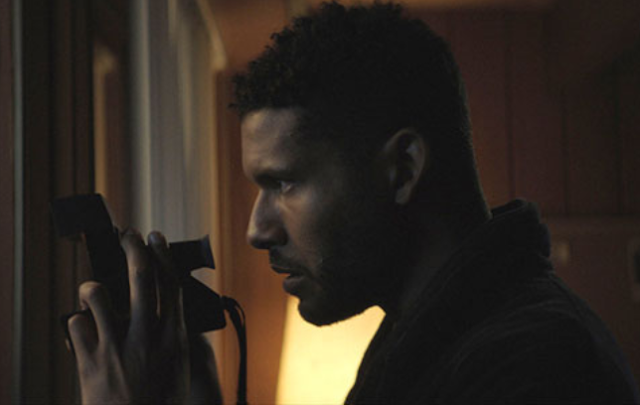Why Shudder's Spiral gets the doubted protagonist trope right
It’s a common trope in horror – not only is your protagonist menaced by an otherworldly threat, their loved ones refuse to believe them. It’s a cliché that can sometimes become wearing, but new Shudder release Spiral is a rare example of it being used to further character development and thematic explorations.
Warning: This article contains spoilers for Spiral
Characters’ refusal to believe the protagonist is a
narrative technique employed for a variety of reasons - to create conflict
between characters, to isolate the protagonist, and to simply pad out the
runtime before things come to a head in the third act.
The trope is memorably used in Fright Night (1985) when no one believes horror nerd Charley’s (William Ragsdale) outlandish claim that his neighbour is a vampire. It also led to Nancy (Heather Langenkamp) in Nightmare on Elm Street (1984) getting bars put on her bedroom window when no one believes her about Freddy Krueger. Hereditary, The Invisible Man and The Wretched all feature protagonists whose sanity is doubted when they start talking about a supernatural threat.
Some of the frustration viewers have with this trope comes from the fact we see similar scenes repeated over and over again. It can alienate us from a lead we’re supposed to root for if they become hysterical when faced with disbelief.
Spiral finds Malik (Jeffrey Bowyer-Chapman) and his partner Aaron (Ari Cohen) moving to a new town with very suspicious neighbours. Malik begins to suspect the community has sinister plans for them, but Aaron accuses him of overreacting - and it’s true Malik fails to mention key details which would help him be believed.
The movie shows the difficulties victims of violence and trauma have getting their voices heard.
Early in the film Malik paints over a homophobic slur
spray-painted on the couple’s living room wall, an alarming incident which
would immediately have alerted Aaron that there’s trouble afoot. Yet Malik is
anxious not to confirm Aaron’s belief about him being unjustifiably suspicious
of their straight, white neighbours, or hamper Aaron’s desire to fit into their
new community.
We later learn Aaron is desperate to ‘make friends who are a bit more normal’, leading Malik to accuse him of being ‘an Uncle Tom for gay people’, i.e. excessively pandering to his straight peers. The race-related ‘Uncle Tom’ epithet isn’t accidental either, since these ‘normal’ friends are all white too.
While Malik has been out since his teens, Aaron was married to a woman before going through a difficult divorce. We assume Aaron passed as straight throughout his early adult life, explaining in part why he’s more eager to seek out straight friends than Malik since that’s the community he grew up in.
Malik meanwhile remains traumatised from seeing his teenage boyfriend beaten to death by a band of homophobic thugs. Not only does he have understandable trust issues because of this, but Aaron interprets his legitimate concerns as paranoia about further violence. When Malik tries to explain the family’s in trouble, Aaron tells him: “You need to stop thinking that everyone’s trying to get you all the time. What happened to you was tragic, but it’s not going to happen again.”
Aaron, who doesn’t get treated to icy stares every time he goes out for a run
and comes from a different - arguably more privileged - background, fails to
see things from Malik’s perspective. While Aaron’s disbelief is necessary to
the plot, it’s justified by the characters’ past experiences and helps explore
the fault lines within an otherwise loving couple.
The film as a whole is interested in who and what people will believe, and Aaron’s unwillingness to take Malik’s concerns seriously is also linked to people’s desire to believe the cult’s story that Malik murdered Aaron and Kayla. As Marshall (Lochlyn Munro) tells him in his prison cell: “Not one soul will question it because of who you are. People won’t care - they’ve already got their minds made up. They’re afraid of you, and when the tides change there will be someone else to be afraid of.”
In a narrative just as powerful as Leigh Whannell’s incisive
exploration of gaslighting in The
Invisible Man, the movie shows the difficulties victims of violence and
trauma have getting their voices heard. It takes a standard horror trope of the
protagonist not being believed, but backs this up with enough character development
and political depth to make it a key component of the narrative rather than
just a genre cliché.
Spiral is available to stream on Shudder.
For more deep dives into recent horror releases, check out the rest of The Lowdown series.
Fill your Twitter feed with weekly horror content. Follow us:






Thank You For Sharing this Contant with us . It will be very useful in Future , One More thing is that , if you are using Binge Digital OTT Platform , & having problem related to this , You can go on
ReplyDeleteBinge Costumer Support Helpdesk Number , Our Team of Experts available here for help you 24*7